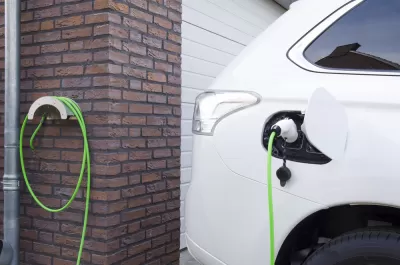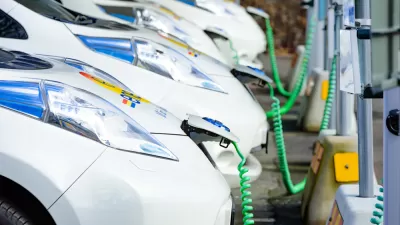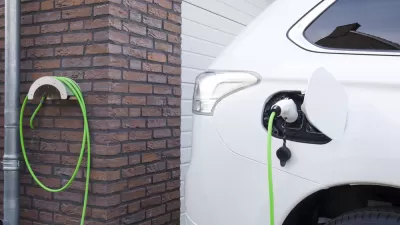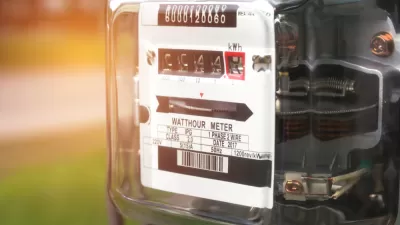What's the best way to ensure that electric vehicle drivers pay to maintain the roads they drive on, considering they don't pay fuel taxes? A new report from the UC Davis Institute of Transportation Studies was sent to the California legislature.

With the rejection of Proposition 6 in California last November, a new "Road Improvement Fee" for zero-emission motor vehicle model year 2020 and later will take effect July 1, 2020. The $100 annual registration fee, to be adjusted for inflation, will apply to any "motor vehicle that is able to operate on any fuel other than gasoline or diesel fuel," per the Road Repair and Accountability Act of 2017 (aka Senate Bill 1).
Revenues will be deposited into the Road Maintenance and Rehabilitation Account, thus ensuring that drivers who pay little or no fuel taxes will be paying to maintain the roads and bridges they drive on. But is that the best way to ensure electric vehicles pay "their fair share" of road maintenance?
Alan Jenn, a UC Davis research scientist with the Plug-In Hybrid & Electric Vehicle Research Center, doesn't think so, calling it neither effective nor sustainable in a new report requested by the California Legislature, writes Stephen Kulieke.
“The California zero-emissions vehicle registration fee doesn’t support the long-run funding of transportation infrastructure, nor is it equitable for drivers of electric and hydrogen vehicles,” said Jenn.
“California now has the opportunity to support alternative funding mechanisms,” Jenn said. “Our study finds that a per-mile road charge, designed specifically for zero-emission vehicles [ZEVs], is a relatively low-cost and sustainable solution to funding our roads.”
In March 2017, the California State Transportation Agency completed a 9-month pilot program of a road usage charge, similar to the Oregon program in operation since July 2015. However, Jenn is proposing that the California road charge apply only to ZEVs. Gasoline and diesel-powered vehicles would continue to pay 55.53 cents-per-gallon and 87.35 cents-per-gallon taxes, respectively, per API, now adjusted for inflation thanks to SB 1.
"Electric and hydrogen vehicles should be the only ones subject to the charge, Jenn said, since they come with advanced diagnostic software already built in, meaning a mileage-tracker can more easily log miles and send that information to whoever charges the tax," reports David Iaconangelo for E&E News (subscription).
The issue transcends the Golden State. According to the National Conference of State Legislatures, as of last summer, 19 states have enacted electric vehicle registration fees to ensure these vehicles pay for road upkeep, with many applying the fee to conventional hybrid vehicles as well.
Hat tip to Streetsblog California.
FULL STORY: How to Fund Roads and Ensure Electric Vehicles Pay Their Share

Alabama: Trump Terminates Settlements for Black Communities Harmed By Raw Sewage
Trump deemed the landmark civil rights agreement “illegal DEI and environmental justice policy.”

Study: Maui’s Plan to Convert Vacation Rentals to Long-Term Housing Could Cause Nearly $1 Billion Economic Loss
The plan would reduce visitor accommodation by 25% resulting in 1,900 jobs lost.

Planetizen Federal Action Tracker
A weekly monitor of how Trump’s orders and actions are impacting planners and planning in America.

Wind Energy on the Rise Despite Federal Policy Reversal
The Trump administration is revoking federal support for renewable energy, but demand for new projects continues unabated.

Passengers Flock to Caltrain After Electrification
The new electric trains are running faster and more reliably, leading to strong ridership growth on the Bay Area rail system.

Texas Churches Rally Behind ‘Yes in God’s Back Yard’ Legislation
Religious leaders want the state to reduce zoning regulations to streamline leasing church-owned land to housing developers.
Urban Design for Planners 1: Software Tools
This six-course series explores essential urban design concepts using open source software and equips planners with the tools they need to participate fully in the urban design process.
Planning for Universal Design
Learn the tools for implementing Universal Design in planning regulations.
Caltrans
Smith Gee Studio
Institute for Housing and Urban Development Studies (IHS)
City of Grandview
Harvard GSD Executive Education
Toledo-Lucas County Plan Commissions
Salt Lake City
NYU Wagner Graduate School of Public Service





























